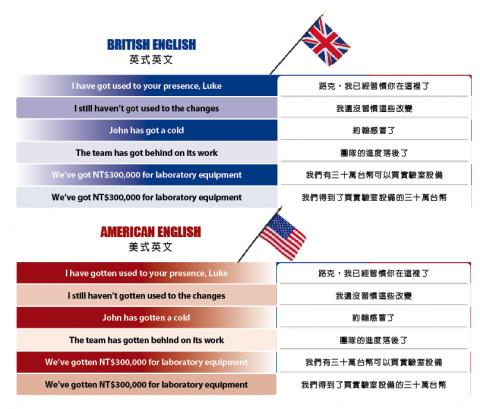Many people confuse the words “got” and “gotten,” and believe the latter to be an American linguistic innovation. Actually, there is a very logical distinction between the two, and it is the British who have dropped the usage of “gotten,” not the Americans who have invented it.
According to the Oxford English Dictionary, the first use of gotten can be traced back to the 4th century, long before American even existed.
Simply stated, “got” is the past tense of “get,” while “gotten” is its past participle, in the same way that English has eat/ate/eaten and forget/forgot/forgotten. In American English, it is possible to say “I got a cold last week” and “I have gotten a cold.” The British, on the other hand, have forgotten how to use gotten (they forgot it, apparently, about 300 years ago) and now use “got” as both past simple and past participle. A Brit would therefore say “I got a cold last week” and “I have got a cold.”

In British English, then, it’s quite simple: just use “got.” The word “gotten” only exists in British English in established phrases such as “ill-gotten gains.”
Another way to think of the distinction between “got” and “gotten” in American English is that “have got” refers to possession (“I have got eight cars”) and “have gotten” (the present perfect of “to get”) describes a dynamic situation (“I have gotten [obtained/acquired] eight cars over the course of the past few years”).
(Paul Cooper, Taipei Times)
許多人把「got」和「gotten」這兩個字搞混,以為「gotten」是美國語言所新創。但這兩個字之間有很合邏輯的區別,其實是英國人捨棄不用「gotten」一字,並非美國人發明了這個字。
根據牛津英語字典,「gotten」的首次使用可追溯到西元第四世紀,年代遠早於美國人。
簡言之,「got」是「get」的過去式,而「gotten」則是其過去分詞,如同英文動詞變化eat∕ate∕eaten,以及forget∕forgot∕forgotten一樣。在美式英文中,可以說「I got a cold last week」(我上週感冒了),以及「I have gotten a cold」(我感冒了)。但英國人卻忘了怎麼用「gotten」(顯然他們是在約三百年前忘記的),如今是把「got」兼用作簡單過去式和過去分詞。因此英國人會這樣說:「I got a cold last week」(我上週感冒了),以及「I have got a cold」(我感冒了)。
這在英式英文就非常簡單:只要用「got」即可。在英式英文中,「gotten」一字只存於既定的片語,例如「ill-gotten gains」(不義之財)。
美式英文中「got」和「gotten」的區別,可用另一種方式思考:「have got」是指「擁有」,例如「I have got eight cars」(我有八輛車);而「have gotten」(「to get」的現在完成式)則是描述一種動態的情況,例如「I have gotten [obtained/acquired] eight cars over the course of the past few years」(在過去幾年中,我﹝取得∕購得﹞了八輛車)。
(台北時報林俐凱譯)

China commemorated 80 years since the end of World War II last week with a massive military parade against a backdrop of a disputed history about who ultimately defeated Japan. The issues, including Japan’s reckoning with its wartime record in China, are bound to flare again in December, a flashpoint anniversary of the mass killing in Nanjing by invading Japanese troops. Below is an explainer about what the different — and disputed — points of view are. WHAT IS CHINA’S VIEW? For the Chinese government sitting in Beijing, this is a clear-cut issue: China sacrificed 35 million people in a heroic and brutal struggle

Rarely does Nature present such a striking contradiction as the one found in Lencois Maranhenses National Park. Located along Brazil’s northeastern coast, the park unveils breathtaking scenery, where rippling sands meet crystal-clear lagoons. Under the sun’s golden glow, the waters glitter in shades of turquoise and emerald. So surreal is this spectacle that visitors might wonder if they’re gazing at a digitally modified photo rather than a living landscape. Were it not for the unique geographical and climatic conditions, such a marvel would not exist. Unlike typical deserts, Lencois Maranhenses receives a substantial amount of rainfall, particularly during the rainy season

A: Wow, animated fantasy film “KPop Demon Hunters” (KDH) has become Netflix’s most viewed film ever. B: Isn’t that the movie about a K-pop girl group secretly serving as demon hunters? A: Yeah, and its theme song “Golden” was No. 1 on the Billboard chart. B: The hit performed by HUNTR/X — the girl group from KDH — has inspired a “Golden challenge,” as celebrities are racing to cover its sky-high notes. A: Cool, let’s try it out. A: 哇,動畫電影《KPop獵魔女團》近日已成為網飛上觀看次數最多的電影。 B: 這部電影不是關於某韓流女團,成員秘密擔任惡魔獵人的故事? A: 對,主題曲《Golden》更勇奪告示牌單曲榜冠軍呢! B: 該曲由電影中的女團「HUNTR/X」所演唱,甚至還掀起一股全球《Golden》大挑戰︰一堆名人挑戰翻唱該曲飆高音。 A: 酷喔我們也來挑戰吧。(By Eddy Chang, Taipei Times/台北時報張迪)

A: Apart from megahit “KPop Demon Hunters,” what else is worth watching? B: The new shows featuring four top-tier actors – Xiao Zhan, Wang Yibo, Yang Yang and Li Xian — are all popular. A: Yang’s TV drama, “The Immortal Ascension,” is definitely one of the summer sizzlers. Some praise it as the Eastern edition of the glorious “Harry Potter” series. B: Yeah, the costume fantasy drama is about a young man’s journey to immortality. All the magic powers and magical tools in the show are just stunning. A: Let me go stream it now. I wanna